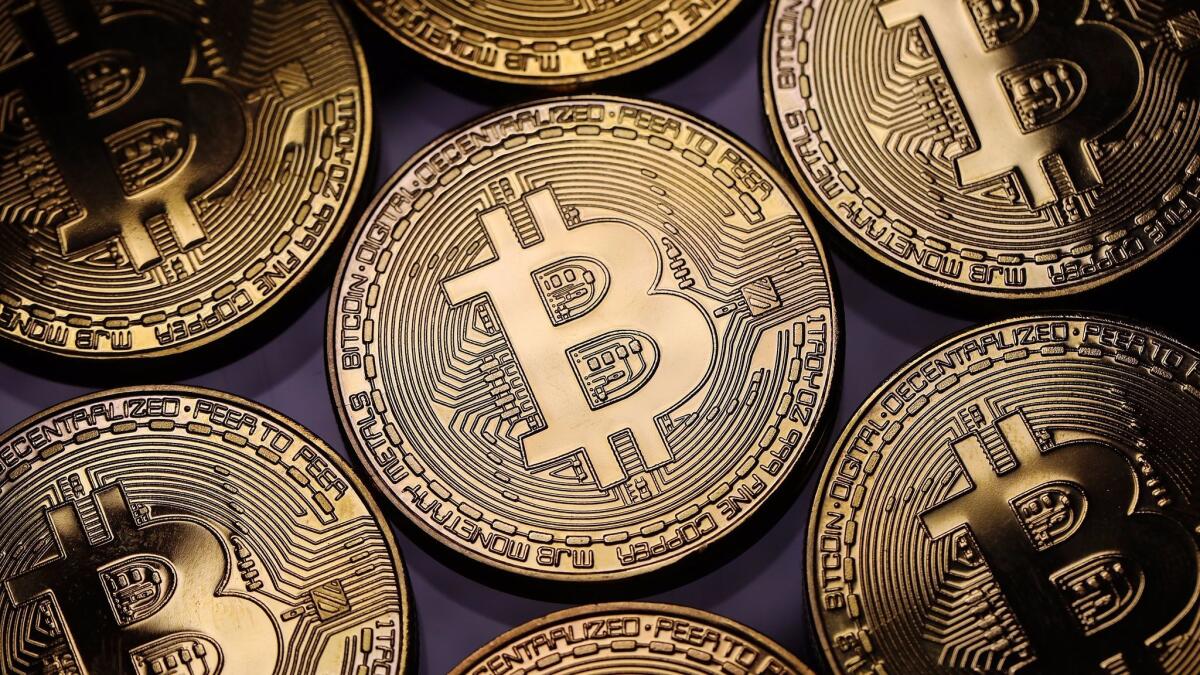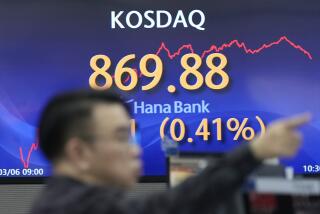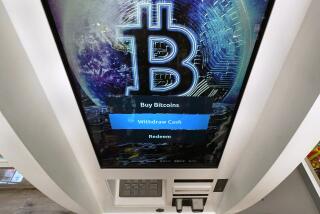Bitcoin’s price swings wildly, touching above $19,000

The price of bitcoin swung wildly Thursday, rising to more than $19,000 only to fall sharply within minutes. The frenzy surrounding the virtual currency escalated just days before it starts trading on a major U.S. exchange.
The frenzy even has parts of Wall Street concerned. A group of banks complained that federal regulators approved bitcoin futures, which begin trading Sunday, too quickly and without properly considering the inherent risks in the virtual currency.
Around 10:40 a.m. Pacific Time, one bitcoin was valued at $15,872, according to Coinbase; it briefly surged above $19,000 earlier in the day. Last week, the price of a bitcoin topped $10,000 for the first time. At the start of the year, it was worth less than $1,000. Coinbase, the largest bitcoin exchange, tweeted that record-high traffic had caused interruptions to its service Thursday.
The price swings are occurring not long before bitcoin starts trading on two established U.S. exchanges. Futures for bitcoin will start trading on the Chicago Board Options Exchange on Sunday evening and on the Chicago Mercantile Exchange a week later.
The Futures Industry Assn., which represents Wall Street’s biggest banks and clearinghouses, sent a letter to the Commodities Futures Trading Commission, saying that as the guarantors of customers trades, they should have been consulted before trading in bitcoin futures was approved. They expressed concern that the extreme volatility tied into bitcoin could leave banks exposed when the futures move too violently.
The price swings are occurring just as the trading community prepares for bitcoin to start trading on two established U.S. exchanges. Futures for bitcoin will start trading on the Chicago Board Options Exchange on Sunday evening and on crosstown rival CME Group’s platforms later in the month.
That has increased the sense among some investors that bitcoin is gaining in mainstream legitimacy after several countries, such as China, tried to stifle the virtual currency.
Bitcoin is the world’s most popular virtual currency. Such currencies are not tied to a bank or government and enable users to spend money anonymously. They are basically lines of computer code that are digitally signed each time they are traded.
A debate is raging on the merits of such currencies. Some say they serve merely to facilitate money laundering and illicit, anonymous payments. Others say they can be helpful methods of payment, such as in crisis situations where national currencies have collapsed.
Miners of bitcoins and other virtual currencies help keep the systems honest by having their computers keep a global running tally of transactions. That prevents cheaters from spending the same digital coin twice.
Meanwhile, there are fresh concerns about the security of bitcoin and other virtual currencies after NiceHash, a company that mines bitcoins on behalf of customers, said it is investigating a breach that may have resulted in the theft of about $70 million worth of bitcoin.
Research company Coindesk said a wallet address referred to by NiceHash users indicates that about 4,700 bitcoins had been stolen. NiceHash said it will stop operating for 24 hours while it verifies how many bitcoins were taken. Wallet is a nickname for an online account.
NiceHash did not respond to an emailed request for more details about its own breach.
“The incident has been reported to the relevant authorities and law enforcement and we are cooperating with them as a matter of urgency,” it said in a statement, in which it also urged users to change their passwords.
Slovenian police are investigating the case together with authorities in other states, spokesman Bostjan Lindav said. Lindav did not provide details.
In Japan, after the failure of a bitcoin exchange called Mt. Gox, laws were enacted to regulate bitcoin and other virtual currencies. Mt. Gox shut down in February 2014, saying it lost about 850,000 bitcoins, possibly to hackers.
Bitcoin is a digital currency that is not tied to a bank or government and allows users to spend money anonymously. The coins are created by users who “mine” them by lending computing power to verify other users’ transactions. They receive bitcoins in exchange. The coins also can be bought and sold on exchanges with U.S. dollars and other currencies.
Is it a risky investment?
The value of bitcoins can swing sharply. Earlier this month, bitcoin’s value plunged 22% against the dollar in just three days.
Why bitcoins are popular
Bitcoins are basically lines of computer code that are digitally signed each time they travel from one owner to the next. Transactions can be made anonymously, making the currency popular with libertarians as well as tech enthusiasts, speculators — and criminals.
Is it really anonymous?
Yes, to a point. Transactions and accounts can be traced, but the account owners aren’t necessarily known. However, investigators might be able to track down the owners when bitcoins are converted to regular currency.
Who’s using bitcoin?
Some businesses have jumped on the bitcoin bandwagon amid a flurry of media coverage. Overstock.com accepts payments in bitcoin, for example.
Still, its popularity is low compared with cash and cards, and many individuals and businesses won’t accept bitcoins for payments. Some high-profile banking executives have spoken against bitcoin, with JPMorgan Chase Chief Executive Jamie Dimon calling it a “fraud.”
How bitcoins are kept secure
The bitcoin network works by harnessing individuals’ greed for the collective good. Miners keep the system honest by pouring their computing power into a blockchain, a global running tally of every bitcoin transaction. The blockchain prevents rogues from spending the same bitcoin twice, and the miners are compensated for their efforts with the occasional bitcoin. As long as miners keep the blockchain secure, counterfeiting shouldn’t be an issue.
How did bitcoin come to be?
It’s a mystery. Bitcoin was launched in 2009 by a person or group of people operating under the name Satoshi Nakamoto. Bitcoin was then adopted by a small clutch of enthusiasts. Nakamoto dropped off the map as bitcoin began to attract widespread attention. But proponents say that doesn’t matter: The currency obeys its own internal logic.
Last year, an Australian entrepreneur claimed to be the founder of bitcoin, only to say days later that he did not “have the courage” to publish proof that he is.
UPDATES:
10:55 a.m.: This article was updated to reflect swings in bitcoin’s price and the perspective of the Futures Industry Assn.
This article was originally published at 8:45 a.m.






